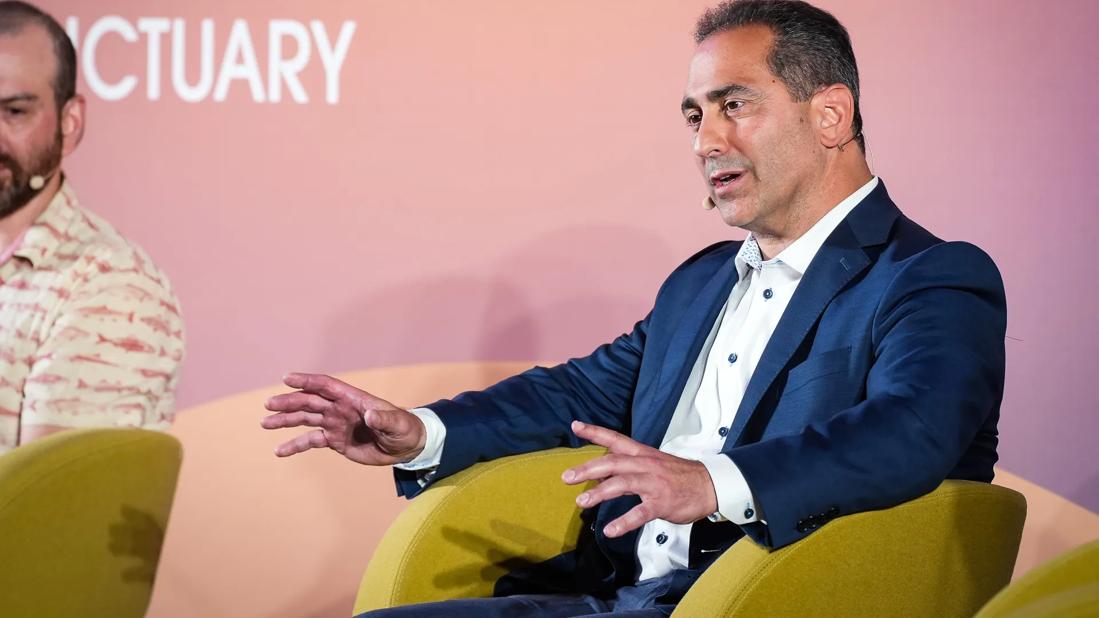Research by Cleveland Clinic and Sports Data Labs to improve health and function in everyday patients as well as elite athletes

Above: Cleveland Clinic sports medicine orthopaedic surgeon Paul Saluan, MD, leads discussion on the rising value of sports performance data during a panel at the 2024 National Basketball Players Association Performance Summit.
Advertisement
Cleveland Clinic is a non-profit academic medical center. Advertising on our site helps support our mission. We do not endorse non-Cleveland Clinic products or services. Policy
Sports performance data is no longer just about biomechanics or outcomes on a playing field. Today’s data can integrate holistic factors like an athlete’s nutrition, sleep and mental health, which impact those measurements.
“We have begun to mine, map and understand the human body in more granular ways than ever before,” says Mark Gorski, CEO of Sports Data Labs, which specializes in collecting and analyzing human data from on-body sensors and other sensing systems. “We are collecting more data with more context from athletes. Advanced sensors and systems are providing real-time, in-game insights.”
And these insights may be valuable not only for winning sporting events but for living healthier every day.
“There’s now increased attention on elite athletes, who may be ideal candidates to help healthcare providers better understand the human body and what it can do,” Gorski says.
Cleveland Clinic sports medicine orthopaedic surgeon Paul Saluan, MD, agrees.
“At Cleveland Clinic, we’re interested in acquiring all the data accessible on elite athletes to significantly improve their performance and recovery,” Dr. Saluan says. “At the same time, the unique insights derived from the expert evaluation of this data could help advance the care of entire populations. These discoveries could be extremely helpful not just in improving athletic performance and recovery, but in improving millions of lives.”
Dr. Saluan discussed this topic in a Gorski-moderated panel discussion at the 2024 National Basketball Players Association Performance Summit. The two-day event gathered professional athletes, sports organization leaders, sports technology experts and others to talk about the latest developments in technology and sports performance. Other speakers at the conference included representatives from NASA, Google and ESPN, as well as active NBA players.
Advertisement
Below is an edited recap of Dr. Saluan’s responses to some of the panel questions.
Dr. Saluan: AI brings incredible opportunities. In addition, Cleveland Clinic, through a partnership with IBM, now has the first-ever healthcare quantum computer. It’s not a super-computer; it’s beyond that. It will be a game-changer in how we use data in healthcare, for sports-related issues as well as other conditions.
For example, some professional sports have made substantial investments in optical tracking technology in combination with in-game sensors. However, reviewing millions of data points and drawing meaningful conclusions has not been feasible. Quantum computing offers a real opportunity to take full advantage of these new data sources to inform everything from sport- or position-specific mechanics to play calling and personal performance. With quantum computing, we will be able to do this in a fraction of the time — rather than over several lifetimes.
Dr. Saluan: Genomics (the study of genomes), proteomics (the study of proteins), metabolomics (the study of metabolites) and other omics are trending in healthcare, but we haven’t yet seen their full impact on sports performance. Better data collection, advanced algorithms, AI and quantum computing may help reveal new insights, including prompting us to ask questions we didn’t even know to ask before. We’re just starting to see the potential.
In addition, our focus in healthcare has shifted from treating disease to promoting wellness. When I was going through surgical training in my 20s and 30s, I was taught to identify diseases and treat them. Wellness wasn’t a big focus in my training. Over the last 15 years or so, that has changed. I’m interested to see how we will make wellness a bigger component of sports medicine and sports performance.
Advertisement
Dr. Saluan: One hurdle is the diminishing revenues of U.S. hospitals. How do we justify spending millions of dollars on performance-related research when our resources are prioritized for everyday patient care? Hospitals and health systems are becoming more reliant on philanthropic donations, third-party support and partnerships.
For example, at Cleveland Clinic, we recently joined forces with the Cleveland Cavaliers and Bedrock Real Estate to begin building the Cleveland Clinic Global Peak Performance Center, slated to open in 2027. The center is anticipated to be one of the most advanced training facilities in the world.
It will serve the Cleveland Cavaliers and other elite and professional athletes from around the world as well as people in our community, no matter their athletic ability. Club, collegiate and high school athletes; weekend warriors; marathon runners: All athletes at all levels of all sports will come for training and comprehensive care.

Image content: This image is available to view online.
View image online (https://assets.clevelandclinic.org/transform/b2750b5d-884e-4229-85a2-2b04b4f1935a/Global-Peak-Performance-Center)
A rendering of the Cleveland Clinic Global Peak Performance Center.
Another example is Cleveland Clinic’s recent partnership with Sports Data Labs. Together, we will work to create the largest compilation of sports health data, in part by using Sports Data Labs’ advanced data collection and distribution technologies for people who come to the Global Peak Performance Center. Our goal is to use the data to find new ways to optimize human performance and minimize injury in athletes and other individuals.
Cleveland Clinic has opened doors to third-party collaborations, which will allow us to do more than we could in the past. Appropriate partnerships with appropriate vision and allocation of resources are helping us navigate in our current healthcare climate.
Advertisement
Dr. Saluan: That’s what we are hoping to do through the Global Peak Performance Center. Yes, there will be an elite athlete side to it, for the Cavaliers and other professional athletes, but there also will be a community side for people from the region to get the same type of care in the same building with the same healthcare personnel. We will bring the care we provide elite athletes — employing innovative technologies, high-tech training equipment and robust research — to school-aged athletes and other everyday movers.
The data we capture and assess will be applied to everyone, not just to optimize athletic performance but to improve overall human performance.
Advertisement
Advertisement

A behind-the-scenes look at Cleveland Clinic’s role as medical services provider of the 2023 Summer Series

Rest is often not the best care for gamers’ overuse injuries

Findings reinforce the benefits of long-term high physical activity, lower smoking rates and better baseline health

Systematic review of MOON cohorts demonstrates a need for sex-specific rehab protocols

Clinical complexity demands personalized care strategies

Most return to the same sport at the same level of intensity

Cleveland Clinic’s Esports Medicine team weighs in on importance of multidisciplinary care

Gamers are athletes who can benefit from athletic training